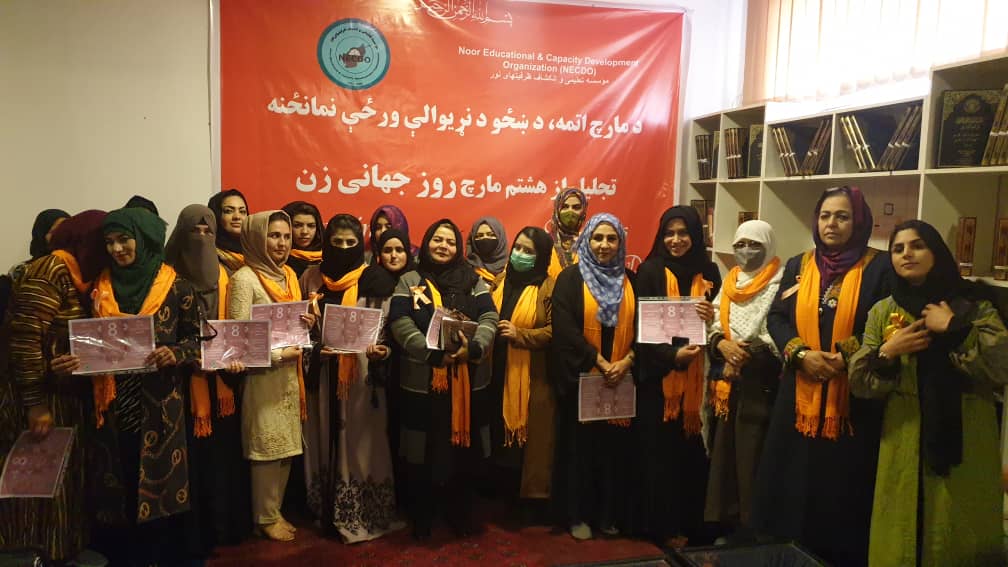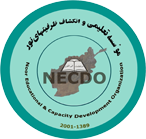NECDO Past Experience in Gender-Based Violence GBV
Violence against women is a worldwide dilemma, when we talk of violence against women in conflict states then the situation is worse. Afghanistan in past four decades ongoing violence and conflict is passing from a transition period. The insecurity is growing wider the by re empowerment of Taliban in most part of Afghanistan. Therefore, violence against women in Afghanistan records show up veil in the year 2015 and 2016. It’s always challenging and more energy consuming when the status quo is challenged. Afghanistan is man dominated country with history of patriarchal and cultural upper handed. NECDO is demined to continue the journey with all challenges, and we pursue to target those provinces which shows higher raise in domestic violence in the year 2015 and 2018.
Through the successful and a very practical project “ Mobilizing Afghan man to protect women rights peace and democracy” which was successfully implemented by the kind support of P&D in the year 2016 in four provinces Kabul, Badakhshan, Nangarhar and Parwan which targeted 426 men 399 women total of 825 persons.
NECDO is an active member of the Protection Cluster and participates in the meetings of this cluster. And NECDO conducted 16-day GBV campaign every year, our campaigns include holding conferences, seminars, workshops, poster printing, campaign through social media and websites. “The16 Days of International Activism on Elimination of Violence Against Women is celebrated annually from November 25 to December 10. In these programs together women activists from all parts of society, including university professors, teachers, writers, journalists, and others, and shared their concerns and demands with the international community, the media, and officials of the Islamic Emirate of Afghanistan.
Social Media Campaign: Violence against women is a global phenomenon closely related to the social and cultural context of a society. Media has significant impact on a society, and it always helps in preventing and elimination of violence through raising awareness on the social, psychological, and material harms it causes to the people in the societies. Through media the people in the society get aware of each other rights. Media can play vital role in abolishing violence against women NECDO, therefore, used social media as one of the tools for its campaign. NECDO has its social media pages, websites and Tweeter, and messenger utilized to spread its anti-violence messages in both Pashto and Dari languages during this campaign, a large number of recipients benefited from the messages.
Distribution of posters: For the vast coverage of the people and for the people who do not have access to social media as well as the very common people in the country, NECDO published the posters carrying the messages against gender-based violence in the country, giving awareness on the rights of women. These posters had general messages for public awareness from both law and Islamic teachings perspectives and because Afghanistan is an Islamic country, the posters were carrying photos and paintings on the violence against women and its bad impact the society. NECDO also aimed to increase the visibility of the posters in addition to engage more people in the community build their personal capacity. The posters were distributed through a proper list developed by NECDO administration and were stick in public areas. The posters were developed in both national languages Pashto and Dari.
Detail: NECDO, in addition, conducted awareness workshops on GBV during the previous year in Kabul. The participants were students, civil society activists, women right activists, government employees, NGO employees, and other men and women with different background, this activity was planned to mobilize people from different categories of the society work together for the elimination of gender-based violence in their respective communities and in particular in educational institutions, market and in transportation hubs.

Imam Initiative for mobilizing the community on women’s Rights and Elimination of Violence Against Women
During years of wars Afghans have been badly affected socially and economically. More than one million Afghans including women, children were killed, disabled, marginalized, and psychosocially stressed. Losses of the country’s natural resources and human capital deficiency due to wars and instability in the country are the severe areas that need tens of years, strong social mobilization including resources. women are one of the severe victims of wars and social injustice who deserve immediate support to come to normality and improved living statue, but due to social and cultural structure of our society until men attitude and behavior is not changed women’s life improvement is not more than a dream. The change of men dominated society is not an easy task it needs multidimensional efforts, and the most important work would be empowerment of Imams who are the most influential body in our society, but they are not well aware of the current changes in modern life and mostly they consider the new changes irrelevant to the Islamic teachings.
Based on the past experience working in coordination with MoWA, MoE, MoRA, AIHRC and having more than 6000 Imams in 22 provinces as human resources NECDO is planning to play its role for mobilizing Afghan man to protect woman rights, empowering 50 Imams and 50 youths take advantage of their influence on the community for public awareness and side by side we plan to empower a group of 100 women activists to encourage other for mobilization of Afghan man to protect woman’s rights. This way by mobilizing the community important and influential figures such as Imams, women activists, youths, and grass roots in very Afghani-zed & localized way.
Domestic violence is a worldwide challenge. NECDO EVAW with the approval of MOWA and MORA working with Imams to promote Human Rights and Women’s right in 2007. The projects idea was taken more professional shape when Ms. Afghani attended WISE conference in Malaysia, in 2008. Miss. Afghani personally learned that moderating the Imam mind-set would be the most beneficial to the country and people of Afghanistan. With great excitement, Miss. Afghani decided to make this idea a reality in Afghanistan. Through, financial support of WISE.
They had to find 25 Imams that would be willing to cooperate with them. They also had to hire a consultant to draft a booklet on five major basic rights of women from Islamic perspective. The 5 booklets were designed by one of the scholars who had great expertise on the issue of women rights. The consultant writings addressed the issue of customs, which has mixed up or has been misinterpreted with Islamic teachings by solid quotations from Quran and Sunnah. The five booklets were shared with 25 Imams in 25 Mosques so that they shared their input. This was a very critical part of the process because NECDO wanted to see if the content made sense at the common level of understanding of the entire community. We also took the viewpoints of the respected WISE friends, and advisors. As we saw that, we evaluated significant changes that were brought and edited.
The Imams were requested to preach these rights in their Friday Khutbas. However, Miss. Afghani had her doubts on whether or not would the Imams collaborate or not. Therefore, she came up with a plan to train 30 youths from dormitory of Kabul University coming from different provinces of Afghanistan to attend the Friday Prayers and remain as observer and write down the report of what they heard in the Khutbas. This was a learning experience for both the youths and the Imams. The women’s own awareness about their rights had increased.
NECDO started its new phase of 12 months by networking getting the extension of support letter from MOWA and that MORA to introduce 20 more Imams from 20 famous other mosques in Kabul and 20 from Jalalabad to work with us on women’s right issue from Islamic perspective. NECDO faced problems with some Imams who believed that the booklets were more of Western mentality and did not fit in our Islamic and culturally based community. In order to ease in the way for the Imams, NECDO arranged four meetings, which were more of workshop type where they had a mixture of moderate and conservative Imams. Through these little group meetings NECDO was able to pave the way for those Imams who were reluctant at first. Finally, the first hesitant Imams were able to understand that NECDO’s project isn’t in clash with the basic and fundamental resources of Islam (Quran and the Sunnah).
The Imams finally agreed to print the booklets and for it to be vastly distributed among the community. NECDO identified 20 Kabul University students for Kabul and 10 Nangahar university students for Jalalabad, which later this number increased by the addition of two female in Jalalabad and 4 students in Kabul, to interlink them with Imams in order to pave the way for a better communication between the two groups.
NECDO found great interest among youths to work on this issue with the NECDO team, but they could include 4 other students in the process voluntarily. From the other side, the Fridays of students were best utilized during the project lifetime. In Kabul 5 female monitors were hired to monitor the women sections of the 10 mosques where the space for women was created and 2 female monitors were hired for the two sections of women created in the most conservative community of Jalalabad.
Their next step was to monitor the Friday speeches of the Imams through the selected students that had received training from NECDO on monitoring, networking, and communication skills. The five issues discussed by Imams were (Right of Marriage, Right of Inheritance, Right of Property, Right of Education, and Right of Mobility) and every other weekly monitoring reports (during the second phase we planned monitoring the mosques based on the request of the imams and giving enough time to the imam to prepare the ground for the women rights issue to speak about on Fridays we sent our monitors twice a month).
From the other side, the Fridays of students were best utilized during the project lifetime by getting small amount of transportation cost was a good source of income for them at the same time they learned a lot from Imams and the community. At the same time, NECDO was able to enlighten 30 Imams and 30 youths and 12 female youths. These were main tools to provide information for the community with distribution of booklets.
The Success of the Project: Through this project, they were able to increase the number of female participants in the masjids. Women had gained more confidence to speak about their rights and how it wasn’t given to them. They were also given more freedom to be able to voice their questions without being afraid or ashamed. The imams we worked with belong to different age category, different provinces initially were believing we were agents of west and suspected us preaching western mentalities, Alhamdulillah now they are only cooperating, but also they accept the mistake why they were not preaching about such things in the past and each one of them are working with other ten imams and in one and half year the circle of imams around us were more than 300 imams. Working with Imams we found great interest among youths, women, and men to work on this project. NECDO taught people to have an open perspective to the rights and wrongs. It allowed people to actually understand their religion.
NECDO has conducted educational and awareness-raising activities for Imams, the details of which are listed in the table below:
